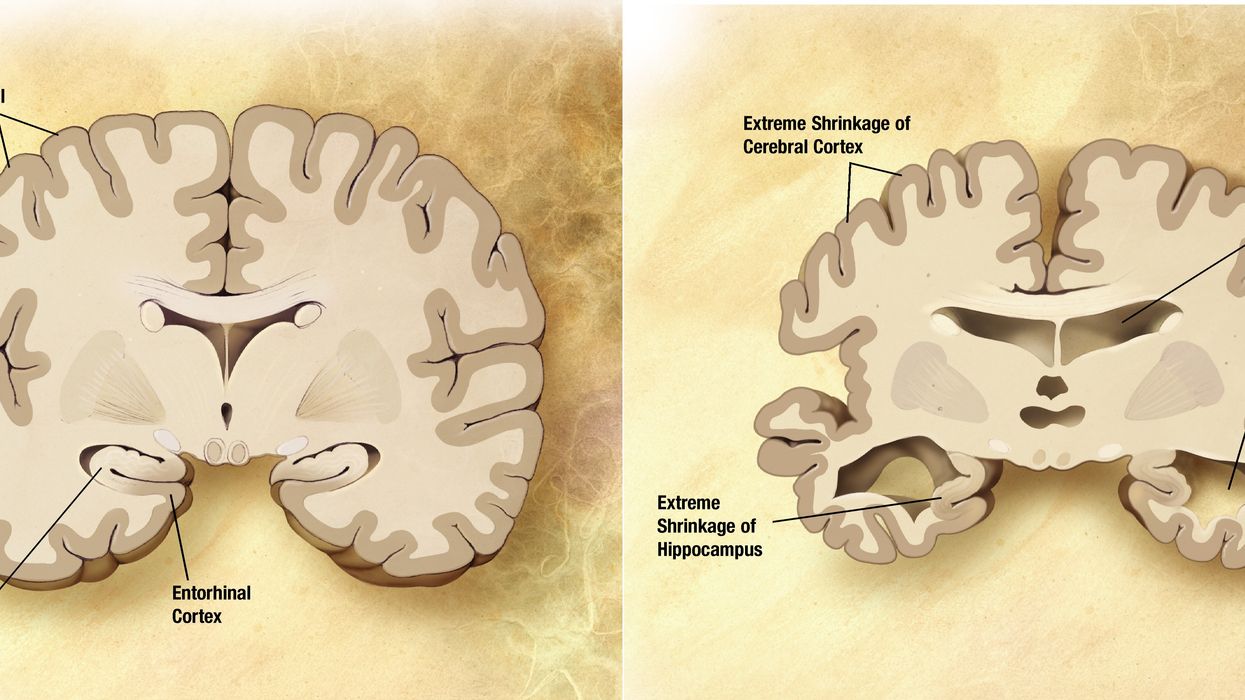Alzheimer's is a complex, progressive neurological disease that makes up 60-80 percent of dementia cases. Symptoms usually begin with mild, but noticeable memory loss, and may advance to the inability to speak or understand surroundings. Someone close to me once said that regular memory loss is, "I can't find my keys." Dementia memory loss is, "I don't know what keys are."
According to recent research posted on the National Institute on Aging website, Alzheimer's specifically affects about 6.5 million people in the U.S., age 65 and older.
What happens in the brain?
Plaques and tangles are believed to be some of the culprits in neurons misfiring and/or shutting down. The Alzheimer's Association shares, "The average brain has 100 billion nerve cells called neurons. Plaques are deposits of a protein fragment called beta-amyloid that build up in the spaces between nerve cells. Tangles are twisted fibers of another protein called tau that build up inside cells."
Here is a video specifically explaining the Tau Protein Pathology:
- YouTubewww.youtube.com
But good news may be on the horizon. A new clinical study, published in the Lancet Neurology Journal, shows promise that it could "be possible to delay symptoms in people genetically fated to develop Alzheimer's at a young age." In the piece, "Scientists Announce Possible Breakthrough in Delaying Alzheimer’s" on Gizmodo, writer Ed Cara reveals that a new trial led by the Washington University School of Medicine set out to re-test Gantenerumab, an "experimental anti-amyloid drug (which could) help people with an inherited form of Alzheimer's."
Cara writes, "In a subset of patients treated the longest, the drug appeared to reduce their risk of developing symptoms as expected, by 50 percent." He adds, "The findings will require follow-up, but outside experts are cautiously optimistic about what this could mean for the future of treating Alzheimer's."
There have been quite a few starts and stops with trials for this particular drug, which is a monoclonal antibody. For some patients in previous trials, there were some pretty hefty side effects as well as flaws in the design of prior studies, which even led to the abandonment of the drug for a while. However, there is a glimmer of hope from doctors and researchers that there is light in this dark, scary diagnosis.
Cara also shares that the senior author and professor of neurology at Washington University Medicine, Randall J. Bateman, claimed, "Everyone in this study was destined to develop Alzheimer’s disease, and some of them haven’t yet. We don’t yet know how long they will remain symptom-free—maybe a few years or maybe decades."

A commenter astutely points out, "This is fantastic news. But one of the big issues—and it is by no means a 'small' task to address—is early detection that's fast and simple. This disease is like a simmering volcano. By the time you realize there's a problem at all, the volcano has already erupted, and you're just playing triage damage control after that.
"But if you can catch it early, before symptoms present, as a normal part of yearly preventative health screenings (not to make light of the accessibility issue of that for so many people), the options to address it expand dramatically. And you get to start treating it before the disease begins to adversely affect people's quality of life, both for those suffering from the disease and for those caring for the people suffering from it."
That is the hope—catching it early and fending it off for as long as possible. And ultimately, eradicating it from our brains completely. It's one step at a time, and this week's steps seem positive.

















 Revenge can feel easier than forgiveness, which often brings sadness or anxiety.
Revenge can feel easier than forgiveness, which often brings sadness or anxiety. 
 In the past two years, two malaria vaccines have become available for babies starting at 5 months of age.
In the past two years, two malaria vaccines have become available for babies starting at 5 months of age. By exploiting vulnerabilities in the malaria parasite’s defense system, researchers hope to develop a treatment that blocks the parasite from entering cells.
By exploiting vulnerabilities in the malaria parasite’s defense system, researchers hope to develop a treatment that blocks the parasite from entering cells. Created with
Created with 

 Volunteers who drive homeless people to shelters talk with a person from Ukraine in Berlin on Jan. 7, 2026.
Volunteers who drive homeless people to shelters talk with a person from Ukraine in Berlin on Jan. 7, 2026.
 Tasks that stretch your brain just beyond its comfort zone, such as knitting and crocheting, can improve cognitive abilities over your lifespan – and doing them in a group setting brings an additional bonus for overall health.
Tasks that stretch your brain just beyond its comfort zone, such as knitting and crocheting, can improve cognitive abilities over your lifespan – and doing them in a group setting brings an additional bonus for overall health. Overdoing any task, whether it be weight training or sitting at the computer for too long, can overtax the muscles as well as the brain.
Overdoing any task, whether it be weight training or sitting at the computer for too long, can overtax the muscles as well as the brain.

 Amoxicillin is a commonly prescribed broad-spectrum antibiotic.
Amoxicillin is a commonly prescribed broad-spectrum antibiotic.  Chart: The Conversation, CC-BY-ND
Chart: The Conversation, CC-BY-ND
 Counterintuitively, social media can make you feel more bored and lonely.
Counterintuitively, social media can make you feel more bored and lonely. Talking about what you’ve read can add a social dimension to what can be a solitary activity.
Talking about what you’ve read can add a social dimension to what can be a solitary activity.